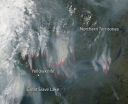(Press-News.org) Ocean acidification is driving changes in waters vital to Alaska's valuable commercial fisheries and subsistence way of life, according to new NOAA-led research that will be published online in Progress in Oceanography.
Many of Alaska's nutritionally and economically valuable marine fisheries are located in waters that are already experiencing ocean acidification, and will see more in the near future, the study shows. Communities in southeast and southwest Alaska face the highest risk from ocean acidification because they rely heavily on fisheries that are expected to be most affected by ocean acidification, and have underlying factors that make those communities more vulnerable, such as lower incomes and fewer employment opportunities.
The term "ocean acidification" describes the process of ocean water becoming more acidic as a result of absorbing nearly a third of the carbon dioxide released into the atmosphere from human sources. This change in ocean chemistry is affecting marine life, particularly the ability of shellfish, corals and small creatures in the early stages of the food chain to build skeletons or shells.
Studies show that red king crab and tanner crab, two important Alaskan fisheries, grow more slowly and don't survive as well in more acidic waters. Alaska's coastal waters are particularly vulnerable to ocean acidification because of cold water that can absorb more carbon dioxide, and unique ocean circulation patterns which bring naturally acidic deep ocean waters to the surface.
"We went beyond the traditional approach of looking at dollars lost or species impacted; we know these fisheries are lifelines for native communities and what we've learned will help them adapt to a changing ocean environment," said Jeremy Mathis, Ph.D., co-lead author of the study, an oceanographer at NOAA's Pacific Marine Environmental Laboratory in Seattle, and the director of the University of Alaska Fairbanks School of Fisheries and Ocean Sciences Ocean Acidification Research Center.
The research presented in the new study examines the potential effects on a state where the fishing industry supports over 100,000 jobs and generates more than $5 billion in annual revenue and helps maintain the U.S. balance of trade in the global economy. Additionally, approximately 120,000 people or roughly 17 percent of Alaskans rely on subsistence fisheries for most, if not all of their dietary protein. Fishery-related tourism also brings in $300 million annually.
"Ocean acidification is not just an ecological problem—it's an economic problem," said Steve Colt, Ph.D., co-author of the study and an economist at the University of Alaska Anchorage. "The people of coastal Alaska, who have always looked to the sea for sustenance and prosperity, will be most affected. But all Alaskans need to understand how and where ocean acidification threatens our marine resources so that we can work together to address the challenges and maintain healthy and productive coastal communities."
The study recommends that residents and stakeholders in vulnerable regions prepare for this environmental challenge and develop response strategies that incorporate community values and needs. "This research allows planners to think creatively about ways to help coastal communities withstand environmental change," said Sarah Cooley, Ph.D., co-lead author who was at the Woods Hole Oceanographic Institution while doing the research and is now science outreach manager at Ocean Conservancy, in Washington, D.C. "Adaptations can be tailored to address specific social and environmental weak points that exist in a community."
While acknowledging that the most important way to address ocean acidification is by reducing carbon dioxide emissions globally, the research shows that by examining all the factors that contribute to risk, more opportunities can be found to prevent harm to human communities at a local level. Decision-makers can address socioeconomic factors that lower the ability of people and communities to adapt to environmental change, such as low incomes, poor nutrition, lack of educational attainment and lack of diverse employment opportunities. NOAA's Ocean Acidification Program and the state of Alaska are also developing tools to help industry adapt to increasing acidity.
INFORMATION:
The new study is the first published research by the Synthesis of Arctic Research (SOAR) program, which is supported by an inter-agency agreement between NOAA's Office of Oceanic and Atmospheric Research and the Bureau of Ocean Energy Management (BOEM) Alaska Region. More information on SOAR is available online.
NOAA's mission is to understand and predict changes in the Earth's environment, from the depths of the ocean to the surface of the sun, and to conserve and manage our coastal and marine resources. Join us on Twitter, Facebook, Instagram and our other social media channels.
NOAA: Alaska fisheries and communities at risk from ocean acidification
2014-07-29
ELSE PRESS RELEASES FROM THIS DATE:
Preterm children's brains can catch up years later
2014-07-29
There's some good news for parents of preterm babies – latest research from the University of Adelaide shows that by the time they become teenagers, the brains of many preterm children can perform almost as well as those born at term.
A study conducted by the University's Robinson Research Institute has found that as long as the preterm child experiences no brain injury in early life, their cognitive abilities as a teenager can potentially be as good as their term-born peers.
However, the results of the study, published in this month's issue of The Journal of Pediatrics, ...
New anesthesia technique helps show cause of obstruction in sleep apnea
2014-07-29
July 29, 2014 – A simplified anesthesia procedure may enable more widespread use of preoperative testing to demonstrate the cause of airway obstruction in patients with severe sleep apnea, suggests a study in Anesthesia & Analgesia.
Dr. Joshua H. Atkins and Dr. Jeff E. Mandel of the University of Pennsylvania and their colleagues have developed a new "ramp control" anesthetic technique for putting patients to sleep briefly-just enough to show the "obstructive anatomy" responsible for sleep apnea. The simplified technique requires no special expertise and limits drops ...
Mysterious esophagus disease is autoimmune after all
2014-07-29
Achalasia is a rare disease – it affects 1 in 100,000 people – characterized by a loss of nerve cells in the esophageal wall. While its cause remains unknown, a new study by a team of researchers at KU Leuven in Belgium, the University of Bonn in Germany and other European institutions confirms for the first time that achalasia is autoimmune in origin. The study, published on 6 July in Nature Genetics, is an important step towards unraveling the mysterious disease.
When we swallow, a sphincter in the lower esophagus opens, allowing food to enter the stomach. Nerve cells ...
Worldwide water shortage by 2040
2014-07-29
Two new reports that focus on the global electricity water nexus have just been published. Three years of research show that by the year 2040 there will not be enough water in the world to quench the thirst of the world population and keep the current energy and power solutions going if we continue doing what we are doing today. It is a clash of competing necessities, between drinking water and energy demand. Behind the research is a group of researchers from Aarhus University in Denmark, Vermont Law School and CNA Corporation in the US.
In most countries, electricity ...
Mortality rates increase due to extreme heat and cold
2014-07-29
Epidemiological studies have repeatedly shown that death rates rise in association with extremely hot weather. The heat wave in Western Europe in the summer of 2003, for example, resulted in about 22,000 extra deaths. A team of researchers led by Dr. Alex-andra Schneider at the Institute of Epidemiology II at the Helmholtz Zentrum München examined the impact of extreme temperatures on the number of deaths caused by cardiovascular disease in three Bavarian cities and included both high and low temperatures in the study.
"Our findings confirm the results of our previous ...
A new brain-based marker of stress susceptibility
2014-07-29
DURHAM, N.C. -- Some people can handle stressful situations better than others, and it's not all in their genes: Even identical twins show differences in how they respond.
Researchers have identified a specific electrical pattern in the brains of genetically identical mice that predicts how well individual animals will fare in stressful situations.
The findings, published July 29 in Nature Communications, may eventually help researchers prevent potential consequences of chronic stress -- such as post-traumatic stress disorder, depression and other psychiatric disorders ...
First grade reading suffers in segregated schools
2014-07-29
A groundbreaking study from the Frank Porter Graham Child Development Institute (FPG) has found that African-American students in first grade experience smaller gains in reading when they attend segregated schools—but the students' backgrounds likely are not the cause of the differences.
According to the Center for Civil Rights, although the United States is becoming more racially and ethnically diverse, segregation is still on the rise. To better understand segregation's impact on student performance, FPG scientists looked at nearly 4000 first graders in public schools ...
Local education politics 'far from dead'
2014-07-29
EAST LANSING, Mich. --- Teach for America, known for recruiting teachers, is also setting its sights on capturing school board seats across the nation. Surprisingly, however, political candidates from the program aren't just pushing its national education agenda, they're advancing local issues as well, according to a new study.
The findings, said Michigan State University's Rebecca Jacobsen, refute the argument that school boards have become ineffective and obsolete in the wake of national education reform. Teach for America, a nonprofit that enlists high-achieving college ...
Wildfires continue near Yellowknife, Canada
2014-07-29
The wildfires that have been plaguing the Northern Territories in Canada and have sent smoke drifting down to the Great Lakes in the U.S. continue on. NASA's Aqua satellite collected this natural-color image with the Moderate Resolution Imaging Spectroradiometer, MODIS, instrument on July 26, 2014. Actively burning areas, detected by MODIS's thermal bands, are outlined in red. Copious amount of smoke are drifting northward in this image. Smoke is also creating havoc for residents of Yellowknife. Fire has caused power outages in the area and because of the smoke, line ...
Stem cell advance may increase efficiency of tissue regeneration
2014-07-29
A new stem-cell discovery might one day lead to a more streamlined process for obtaining stem cells, which in turn could be used in the development of replacement tissue for failing body parts, according to UC San Francisco scientists who reported the findings in the current edition of Cell.
The work builds on a strategy that involves reprogramming adult cells back to an embryonic state in which they again have the potential to become any type of cell.
The efficiency of this process may soon increase thanks to the scientists' identification of biochemical pathways ...


